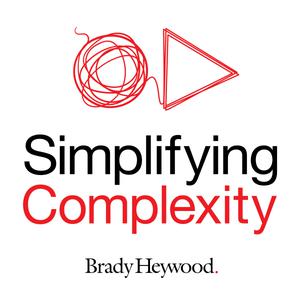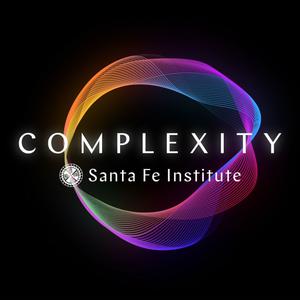
Simplifying Complexity
Sean Brady from Brady Heywood
Simplifying Complexity is a podcast about the underlying principles of complex systems. On the show, we explore the key concepts of complexity science with expert minds from around the world. Each episode focuses on an interview where we break down a specific concept in detail.
- 42 minutes 21 secondsThe diets of half-a-billion-year-old species
In our last two episodes with Professor Jennifer Dunne, the Vice President for Science at the Santa Fe Institute, she explained food webs with a focus on her work in the Gulf of Alaska.
In this episode, Jennifer discusses how fossil records are helping researchers reconstruct food webs from half a billion years ago and the insights we can glean from comparing ancient food webs to modern ones.
Connect:
This show is produced in collaboration with Wavelength Creative. Visit wavelengthcreative.com for more information.11 November 2024, 1:01 pm - 48 minutes 53 secondsFour pieces of music
Today we're joined again by Dmitri Tymoczko, Professor of Music at Princeton University. Last time, Dmitri discussed the underlying principles that make music sound ‘good’.
In this episode, Dmitri explores the integration of music theory into improvisational and algorithmic music. He discusses how modern technology allows musicians to blend traditional and improvisational elements with algorithms to create something completely different from the music of the past.
Resources and links:
Connect:
This show is produced in collaboration with Wavelength Creative. Visit wavelengthcreative.com for more information.28 October 2024, 1:01 pm - 43 minutes 54 secondsHow curiosity works
Today we’re joined by Dani S. Bassett, J. Peter Skirkanich Professor at the University of Pennsylvania and External Professor at the Santa Fe Institute, and Perry Zurn, Visiting Associate Professor of Feminist, Gender, and Sexuality Studies at Cornell University and Provost Associate Professor of Philosophy at American University.
In today’s episode, Dani and Perry explore the concept of curiosity.
Connect:
This show is produced in collaboration with Wavelength Creative. Visit wavelengthcreative.com for more information.14 October 2024, 1:01 pm - 38 minutes 15 secondsUnderstanding Cities - Part 2
In our last episode, Professor Michael Batty from The Bartlett Centre for Advanced Spatial Analysis at University College London explained the evolution of city planning and the fundamentals needed to understand city structures and models.
In today’s episode, Michael delves into various theories and laws for explaining urban systems, the role of different models in understanding and predicting city development, and the need to refine these models to facilitate better management of increasingly complex urban environments.
Connect:
This show is produced in collaboration with Wavelength Creative. Visit wavelengthcreative.com for more information.30 September 2024, 2:01 pm - 29 minutes 8 secondsUnderstanding Cities - Part 1
In this episode, we’re joined by Michael Batty, Bartlett Professor of Planning at University College London and Chair of the Centre for Advanced Spatial Analysis, to discuss the evolution of city planning and the shift away from traditional mechanical views.
In today’s episode, Michael lays the groundwork for understanding cities that will be essential for part two of this conversation.
Connect:
This show is produced in collaboration with Wavelength Creative. Visit wavelengthcreative.com for more information.16 September 2024, 2:01 pm - 46 minutes 2 secondsIn conversation with Jason Fried
Jason Fried is the Co-founder and CEO of 37signals, the software development firm behind Basecamp (a project management app), and HEY (an inbox and calendar app).
In this episode, Jason dives into what 25 years of business has taught him. He shares his advice for hiring staff, getting meaningful insight from reference checks, and why you should always hire a candidate who is the better writer.
Resources and links:
Connect:
- Simplifying Complexity on Twitter
- Sean Brady on Twitter
- Sean Brady on LinkedIn
- Brady Heywood website
This show is produced in collaboration with Wavelength Creative. Visit wavelengthcreative.com for more information.2 September 2024, 2:01 pm - 41 minutes 2 secondsFood webs, humans and cod - Part 2
In this episode, we continue our conversation with Professor Jennifer Dunne, the Vice President for Science at the Santa Fe Institute.
In this episode, Jennifer discusses her work to understand ‘human-centred interaction networks’ - how humans interact with non-human species in a range of ways, including for food - by examining Indigenous cultures around the world and historical migration to Polynesian islands.
Connect:
- Simplifying Complexity on Twitter
- Sean Brady on Twitter
- Sean Brady on LinkedIn
- Brady Heywood website
This show is produced in collaboration with Wavelength Creative. Visit wavelengthcreative.com for more information.19 August 2024, 2:01 pm - 34 minutes 54 secondsFood webs, humans and cod - Part 1
In this episode, Professor Jennifer Dunne, the Vice President for Science at the Santa Fe Institute, explains how you build a food web, focusing on her ecological work in the Gulf of Alaska.
Connect:
- Simplifying Complexity on Twitter
- Sean Brady on Twitter
- Sean Brady on LinkedIn
- Brady Heywood website
This show is produced in collaboration with Wavelength Creative. Visit wavelengthcreative.com for more information.5 August 2024, 2:01 pm - 40 minutes 31 secondsStereotypes and crime
We're joined again by Rajiv Sethi, Professor of Economics at Barnard College at Columbia University and External Professor at the Santa Fe Institute to explore the intersection between stereotyping, crime, and the justice system to understand criminal behaviour beyond simplistic explanations.
Connect:
- Simplifying Complexity on Twitter
- Sean Brady on Twitter
- Sean Brady on LinkedIn
- Brady Heywood website
This show is produced in collaboration with Wavelength Creative. Visit wavelengthcreative.com for more information.22 July 2024, 2:01 pm - 37 minutes 31 secondsThe city of the future
What will the city of the future be like?
To explore the future of our cities, we’re joined once more by Luis Bettencourt, Professor at the University of Chicago and External Faculty at the Santa Fe Institute, as he explains how urban areas will need to evolve in terms of infrastructure and sustainability to match pace with growing populations around the world.
Connect:
- Simplifying Complexity on Twitter
- Sean Brady on Twitter
- Sean Brady on LinkedIn
- Brady Heywood website
This show is produced in collaboration with Wavelength Creative. Visit wavelengthcreative.com for more information.8 July 2024, 2:01 pm - 33 minutes 13 secondsGoverning the power grid
In today’s episode, we’re once again joined by Seth Blumsack, Professor of Energy Policy and Economics and International Affairs in the Department of Energy and Mineral Engineering at Pennsylvania State University, to talk about the power grid.
In the past, we’ve spoken to Seth about the history of the power grid and how the power grid fails. In today’s conversation, we discuss how it is governed.
Connect:
- Simplifying Complexity on Twitter
- Sean Brady on Twitter
- Sean Brady on LinkedIn
- Brady Heywood website
This show is produced in collaboration with Wavelength Creative. Visit wavelengthcreative.com for more information.24 June 2024, 2:01 pm - More Episodes? Get the App
Your feedback is valuable to us. Should you encounter any bugs, glitches, lack of functionality or other problems, please email us on [email protected] or join Moon.FM Telegram Group where you can talk directly to the dev team who are happy to answer any queries.
 Sean Carroll's Mindscape: Science, Society, Philosophy, Culture, Arts, and Ideas
Sean Carroll's Mindscape: Science, Society, Philosophy, Culture, Arts, and Ideas
 The Jim Rutt Show
The Jim Rutt Show
 COMPLEXITY
COMPLEXITY
 Machine Learning Street Talk (MLST)
Machine Learning Street Talk (MLST)
 The Freakonomics Radio Book Club
The Freakonomics Radio Book Club
 Conversations with Tyler
Conversations with Tyler